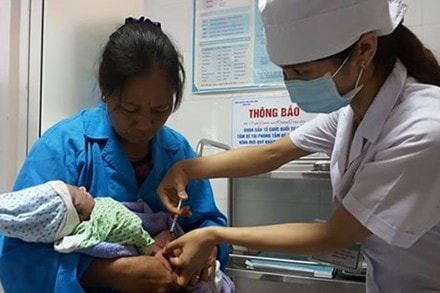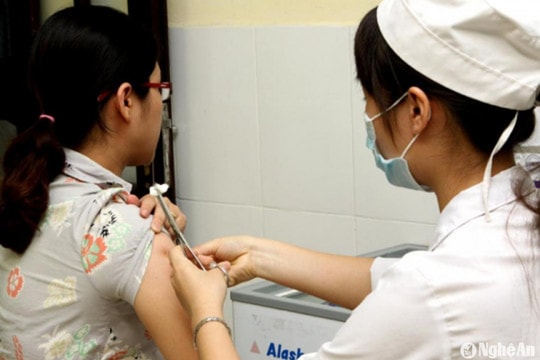Vietnam will control hepatitis B virus
One of the resolutions of the National Expanded Immunization Program next year is to increase the rate of newborn hepatitis B vaccination within 24 hours.
At a press conference to inform about the highlights of the expanded immunization program and challenges in 2017, Dr. Duong Thi Hong, Head of the National Expanded Immunization Office, said that the current rate of hepatitis B vaccination is low.
People lack confidence due to some incidents of newborn deaths after hepatitis B vaccination, although medical experts have determined that the cause of those incidents is not due to the vaccine. Most mothers agree to have their children vaccinated because they trust the doctor, but do not really understand why the vaccination must be given within the first 24 hours after birth.
Medical staff are also "afraid" of hepatitis B vaccination
In addition, some hospitals are hesitant, and even some vaccination staff are afraid to administer this vaccine. Ms. Hong said that this is a concern and also an issue that needs to continue to be prioritized when the target of reducing the rate of hepatitis B infection in newborns for children under 5 years old to below 1% by 2017 of the Expanded Immunization Program is approaching.
“Vietnam needs to increase the rate of newborn hepatitis B vaccination within 24 hours to achieve the goal of controlling hepatitis B by 2017,” said Ms. Hong.
According to Dr. Duong Thi Hong, the hepatitis B vaccine is a recombinant, inactivated vaccine, prepared from the plasma of healthy people carrying the hepatitis B virus surface antigen (HBsAg) without clinical symptoms, so it is not capable of causing toxicity. Therefore, parents should not worry too much about the quality of the vaccine but should vaccinate their children on schedule to protect future generations.
“This vaccine is absolutely safe, does not cause significant side effects, but may cause mild pain at the injection site, but it will go away a few days after injection,” Dr. Duong Thi Hong informed.
 |
| Health workers vaccinate newborns against hepatitis B virus. |
According to medical experts, to prevent hepatitis B, the best way is to fully vaccinate the child with 4 doses, in which the first dose must be given within the first 24 hours after birth. In case the mother does not have hepatitis B, the child still needs to be vaccinated because the child can be infected horizontally during the care process if exposed to the source of the disease.
Children under 10 years of age infected with hepatitis B virus have a 90% chance of developing chronic infection, and 80% of cases lead to liver cancer and cirrhosis due to chronic hepatitis B. Early vaccination can prevent hepatitis B infection, even after exposure to the virus.
In addition, in 2017, in addition to regular immunization activities, the EPI program needs to implement key activities to achieve the goal of continuing to maintain the results of polio eradication and UVSS elimination. Continue to prioritize investment to increase the rate and quality of vaccination in difficult and remote areas.
Strengthen activities to achieve the goal of eliminating measles in the coming time, maintain high rates of measles and measles-rubella vaccines for children in routine immunization, strengthen disease surveillance to detect and respond promptly, and control the spread of epidemics.
Continue to protect the achievements of expanded immunization
Vietnam continues to protect the achievements of polio eradication and neonatal tetanus elimination. Measles and rubella are under control. The mortality rate of many diseases in EPI continued to decrease in 2016.
By the end of October 2016, the full vaccination rate for children under 1 year old reached 83.4%. The measles-rubella vaccination rate for children 18 months old reached 79.1%. June 2016 also marked the completion of the measles-rubella vaccination campaign for men and women aged 16-17 before entering university and going to work.
Nearly 1.8 million 16-17 year olds have been vaccinated against measles and rubella, reaching a rate of 94.9%. As a result, only 34 measles cases were recorded in 2016, a decrease of 442 times compared to 2014 and 8 times compared to 2015.
To maintain the achievements in eradicating polio, in July 2016, the Expanded Immunization Project successfully organized an oral polio vaccine (OPV) campaign for children under 5 years old in 120 high-risk districts in 19 provinces/cities, reaching a rate of 95.3%.
Following WHO recommendations, in May 2016, Vietnam, along with 155 countries, switched from the 3-type polio vaccine to the 2-type polio vaccine (bOPV) to achieve the goal of eliminating polio globally.
According to Zing
| RELATED NEWS |
|---|


